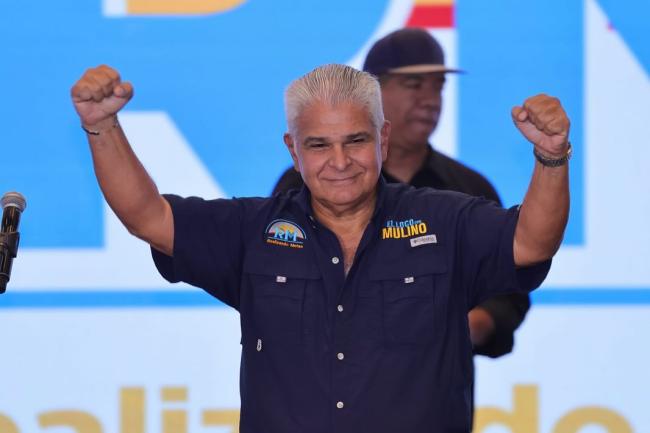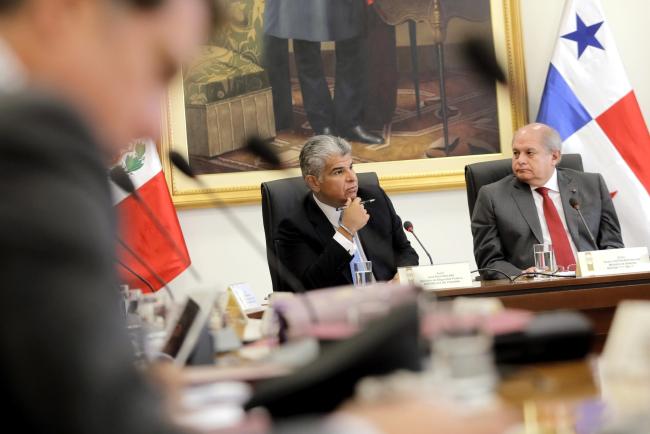
For civic-minded Panamanians, newly elected President José Raúl Mulino’s success will depend on breaking a central campaign promise by breaking with his predecessor.
Chants of “Mulino es Martinelli. Martinelli es Mulino” could be heard in the streets leading up to the May 5 vote. It is a simple campaign slogan, born of the need to improvise two months before election day, when Panama’s courts shook up the presidential race by kicking the leading candidate off the ballot.
One of the country’s most popular and enduring politicians since its return to democracy in 1989, Ricardo Martinelli had been trying for his second round at the presidency. A bellicose populist, his first presidency ended amid scandal and infighting in 2014. Courts ruled that one scandal from that era, in which he diverted public funds to buy himself shares in a media company, deserved 10 years and eight months in prison. Citing the constitution's ban on those with prison sentences greater than five years from holding elected positions, the Electoral Tribunal ruled in May that Martinelli could not run for office. His protégé and running mate, the man who had been Martinelli’s law enforcement chief, moved to the top of the ticket.
The sides of buildings in Panama City were hurriedly plastered with ads of Mulino embracing his convicted mentor across a yellow and sky-blue background. “El loco con Mulino,” read the displays—the crazy one, the madman with Mulino. But “loco” is also a commonplace word used between friends. Television ads showed Martinelli handing Mulino a pair of shoes. In the streets, Mulino supporters displayed yellow and blue flags and baseball caps emblazoned with “RM,” for the party Realizando Metas, that also had Martinelli’s initials.
Voters got little else from Mulino. He skipped the three televised presidential debates. He did only a small number of interviews and campaign events. When he did speak publicly, the message was simple: bring back the good economic times the country enjoyed under Martinelli. It was enough to persuade 34 percent of voters. In a country with no run-off election, that made Mulino the next president.
Mano Dura for Environmental, Indigenous, and Union Protesters
Mulino oversaw Panama’s law enforcement agencies during Martinelli’s presidency from 2009 to 2014, serving first as minister of government and justice and then as minister of security from April 2010 until the end of Martinelli’s term. In these roles, Mulino had authority over the National Police, the Border Police, the Coast Guard-like Aeronaval Service, and the Immigration Service.
One year into Martinelli’s presidency, protests led by unionized banana plantation workers put Mulino at center stage. He publicly advocated for the passage of Law 30, a bill he claimed would reform commercial aviation. In reality, the bill also criminalized street-blocking protests, made changes to labor laws that were criticized by unions, and removed requirements for environmental impact studies on certain construction projects. Critics dubbed it the “Chorizo Law” due to the sundry changes it packed into a single bill.
The banana workers’ protests broke out in July 2010 in Changuinola, in the northwestern province of Bocas del Toro, among predominantly Ngöbe workers. The unionized protesters blocked entrances to their work sites, singling out two measures in the bill: one that eliminated mandatory dues payments, and another they called a strike-busting measure that allowed non-contracted employees to enter the worksite in the midst of a work stoppage. Police attempted to clear out the protesters over a five-day period, escalating to the use of rubber bullets and tear gas. Two protesters were killed and at least 100 were injured, including dozens who lost sight in one or both of their eyes.
Rodrigo Noriega, a legal affairs columnist for La Prensa, named Martinelli and Mulino “the butchers of Changuinola and San Félix” in a story published on the eve of the May election. He called the response “the largest acts of repression undertaken by Panamanian state security bodies in democratic times.”
At the time, Mulino expressed no sympathy for the protesters, claiming that organizers got the Indigenous workers drunk in order to make them protest, according to an EFE report. Human Rights Watch called for an investigation and prosecution of those responsible for the violence.
Panama’s government eventually reached a settlement with the protesters and their families in 2015, paying an $800 monthly stipend to some of the protesters or their families and a one-time payment of $200 to others.
In January 2011, a prison riot by inmates demanding food and water at a facility for minors ended with five inmates being burned to death after police violently intervened. Subsequent investigations found that the fire was caused by cans of tear gas fired into a cell. The officers neglected to open the cell, ignoring pleas for help from the young men. At the time, civil rights groups blamed Mulino and called for his resignation.
Repressive measures were used again in February 2012, when the creation of a copper mine and plans to construct hydroelectric dams were opposed by impacted communities. Legislation allowed the opening of the mine within the semi-autonomous Indigenous province of Ngöbe-Buglé, and residents protested by setting up roadblocks on the Inter-American Highway. Police once again responded forcefully, and three protesters were killed in the clashes.
Voters in the province have not forgotten. Though Mulino won 34 percent of the vote nationally, he earned only 11 percent of the vote in the Ngöbe-Buglé province, trailing behind four other candidates.
In October 2012, protests flared up in the province of Colón over a plan to sell land within the Free Trade Zone of the Caribbean province to foreign companies. Amnesty International called for an investigation into repression by the police that resulted in three additional fatalities, including a young woman and a 9-year-old boy. Mulino—responsible for pubilc security during this period—was never held accountable for the use of force against vulnerable communities.

A Haven for White-Collar Crime
Criminal courts in Panama and the United States have ruled against Martinelli, members of his administration, and even his sons. Mulino has handwaved these convictions away in the same style as populists in Brazil and the United States. “Political persecution,” he has said.
The most troubling case to emerge from the Martinelli years is known as the “Caso Pinchazos.” In 2019, courts found that Panama’s state intelligence authority, the National Defense and Public Security Council, had spied on the communications of more than 150 citizens between 2012 and 2014, including politicians, prosecutors, judges, journalists, and other members of the government. One trial found two members of the council guilty, sentencing them to four years in prison. Martinelli was tried in a separate process, but eventually acquitted on technical grounds.
One victim, Guido Rodríguez, was the director of the daily newspaper Panamá América when he discovered that his email was being monitored. Despite the court’s ruling, Rodríguez is convinced Martinelli was behind the illegal surveillance.
“Mr. Martinelli had a notorious ambition to control everything,” Rodríguez said in an interview. “And in this ambition, he gave the order to tap the phones of all those who he considered a threat, a potential threat, an adversary, a potential friend of his lovers, et. cetera.”
Despite being the security minister at the time, no evidence has linked Mulino to the case. Protected witnesses for the prosecution testified that envelopes containing intercepted communications were delivered directly to Martinelli. However, the two members of the security council who were found guilty in the case worked under Mulino—Alejandro Garúz served as vice minister of security and Gustavo Pérez as director of the National Police until March 2012.
Rodríguez later served as an accounts investigator for the government that followed Martinelli, an office that tracks mismanagement of state funds. He said his office found a total of $323 million in mismanaged funds across several cases under the Martinelli administration.
One such “mismanagement” caught up with Martinelli: a money-laundering scheme that diverted funds from a highway project and a new legislature building to buy shares in the same media company Rodríguez once directed. That conviction tossed Martinelli from the presidential race just weeks before the vote and catapulted Mulino to the presidency.
Martinelli’s two adult sons also pled guilty in a U.S. court to money laundering charges on behalf of his government in a case involving the infamous Brazilian construction company Odebrecht, of Lava Jato fame. A pending criminal process against Martinelli related to Odebrecht is scheduled for December.
Another corruption case did name Mulino directly, involving the allegedly irregular purchase of radars and helicopters from an Italian company in 2010 to combat drug trafficking, but the case was annulled in 2017.
“I don’t think it can be believed that I was done any favors under any circumstance,” Mulino said of the verdict. “Justice has prevailed and for me that’s sufficient. I don’t wish this ordeal on anyone.”
The annulment came one day after Panama’s chief prosecutor, Kenia Porcell, complained of threats and pressures from “economic, political, and business” elites that were attempting to impede the anti-corruption investigations.
Two Mulinos
In the weeks that have followed Mulino’s electoral victory, he has adopted a more conciliatory tone. He held a meeting with members of what is likely to be the chief opposition bloc in the legislature, the Vamos coalition. Martinelli, for his part, has taken to social media to attack the leader of that coalition.
Mulino has also nominated cabinet secretaries from outside Martinelli’s orbit. This softer, more democratic version of Mulino harkens back to a time before serving Martinelli, when he was a member of the Civilian Crusade, the chief organization that opposed the military dictatorship of Manuel Noriega. Mulino served as minister of foreign affairs under the administration of Guillermo Endara from 1989 to 1994, after the fall of Noriega and end of the military regime.
Lina Vega Abad, a columnist focused on human rights and the environment for La Prensa, wrote that Mulino was “not honest with the country” back in 2010 when he was lobbying for the Chorizo Law.
“I saw him as arrogant,” Vega Abad said of her opinion of Mulino during his time as security minister. Now, however, she said she sees daylight between him and Martinelli.
“The minister of [economy and] finance is someone that Martinelli didn’t want,” Vega Abad said of the nomination of Felipe Chapman, a figure outside of Martinelli’s inner circle. “I think he wants to build a good government to change his story.”
Mulino will assume office on July 1 and has indicated he plans to shut down the perilous border crossing between Colombia and Panama. His first test is likely to be whether he meddles in the fate of the former president, who is currently avoiding prison time by sheltering in the Nicaraguan Embassy.
Corey Kane is an independent journalist focused on the environment in Panama. He has written for Ecoaméricas, The Tico Times, and the Houston Chronicle.

